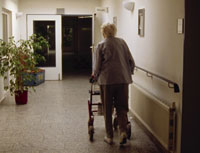
Large numbers of care homes in the UK could face financial difficulty, it has been predicted, as the largest provider, Southern Cross Healthcare, battles to avoid going into administration.
Market analyst William Laing said providers that mainly leased care home properties, as Southern Cross does, or carried high levels of debt relative to their capital, could face problems, as income from councils declined.
[Have your say on the future of residential care in our survey on the issue.]
Though Laing, director of Laing and Buisson, said he did not have figures on the proportion of the market in these two categories, Community Care has been told many care homes are affected.
Southern Cross, which operates 750 homes and serves 31,000 residents, said last week that its rental payments had become unsustainable and that it was in talks with landlords to reduce rents. Ministers have also entered the fray, with government officials monitoring the company to ensure residents are protected.
Laing said Southern Cross’s business model meant that “at a time of difficulties they are vulnerable to any downturn in the market”, as has happened with reductions in placements and fees from local authorities.
In contrast with Southern Cross, Bupa’s profits increased last year. “Southern Cross operates a very different business model from us,” said Oliver Thomas, director of Bupa’s UK care homes. “We own the vast majority of our 305 care homes. We think it’s a better way of going about it.”
Laing said Southern Cross’s vulnerability was exacerbated by its greater dependence on local authority funding at a time of cuts.
Seventy-eight per cent of its revenues come from councils or the NHS. By comparison, Barchester Healthcare, whose profits also rose last year, gets 45% of its business from the state, while 70% of residents in Bupa’s UK care homes are state-funded.
Healthy future for some
Southern Cross is not the only major provider go to through financial difficulties in recent years. Four Seasons Health Care racked up debts of £1.7bn until its main lender, Royal Bank of Scotland, took a 38% stake in the company, reducing its debts to £790m in 2009, after protracted negotiations with creditors.
At the time Pete Calveley, chief executive of Four Seasons Health Care, said: “This agreement to extend the loan gives the group a secure and stable financial position which will allow us to put in place a capital structure for the long term future.”
Laing said that, despite the problems, there was a healthy future for firms with diverse sources of income, due to increased demand from self-funders and the NHS. Last year, Laing and Buisson predicted that, although the number of care home residents in the UK fell between 1996 and 2009, the number would rise from 418,000 in 2010 to 424,000 in 2015.
Thomas said demographic pressures meant that the state would have to remain a “major purchaser of residential care for older people”, despite public spending cuts and the government’s focus on having more people cared for at home.
“You can’t argue with more elderly people in the population needing residential care,” he said. “If you have dementia or are highly dependent, you can’t live at home.”
What do you think? Join the debate on CareSpace
Keep up to date with the latest developments in social care. Sign up to our daily and weekly emails
Related articles


 Bournemouth, Christchurch and Poole
Bournemouth, Christchurch and Poole  Hampshire County Council
Hampshire County Council  Lincolnshire County Council
Lincolnshire County Council  Norfolk County Council
Norfolk County Council  Northamptonshire Children’s Trust
Northamptonshire Children’s Trust  South Gloucestershire Council
South Gloucestershire Council  Wiltshire Council
Wiltshire Council  Wokingham Borough Council
Wokingham Borough Council  Children and young people with SEND are ‘valued and prioritised’ in Wiltshire, find inspectors
Children and young people with SEND are ‘valued and prioritised’ in Wiltshire, find inspectors  How specialist refugee teams benefit young people and social workers
How specialist refugee teams benefit young people and social workers  Podcast: returning to social work after becoming a first-time parent
Podcast: returning to social work after becoming a first-time parent  Podcast: would you work for an inadequate-rated service?
Podcast: would you work for an inadequate-rated service?  Family help: one local authority’s experience of the model
Family help: one local authority’s experience of the model  Workforce Insights – showcasing a selection of the sector’s top recruiters
Workforce Insights – showcasing a selection of the sector’s top recruiters 

 Facebook
Facebook X
X LinkedIn
LinkedIn Instagram
Instagram
Comments are closed.